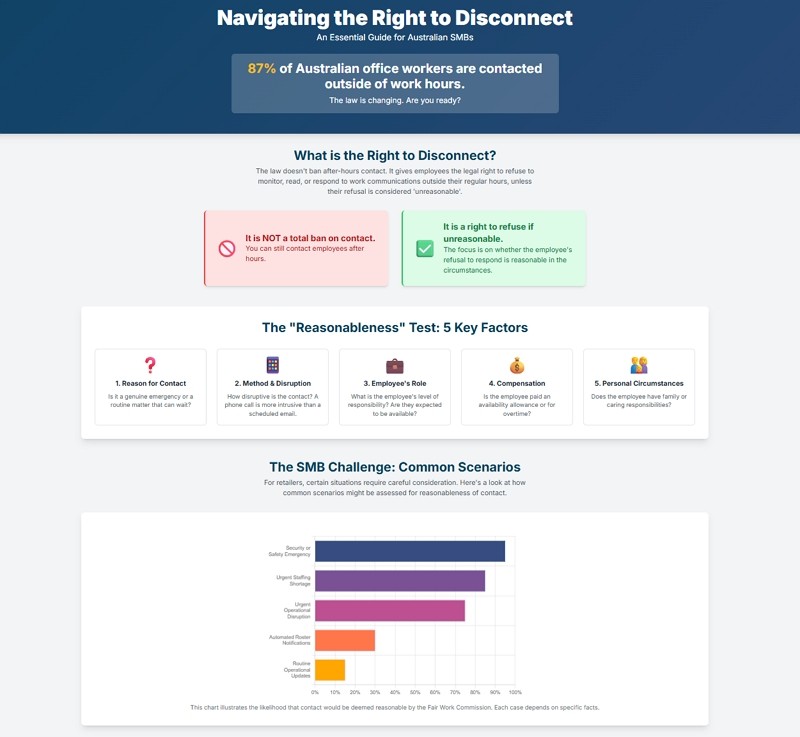Coming the Right to Disconnect Laws

Australia's Right to Disconnect laws will soon apply to small and medium-sized (SMB) businesses. These laws give employees the legal right to refuse to monitor, read, or respond to work-related communications outside of regular working hours unless this refusal is unreasonable. For SMB retailers dependent on flexible staffing and responsive employee communication, immediate compliance planning is essential to maintain operations in compliance with the law.
The Fair Work Ombudsman has developed a resource specifically for SMB businesses preparing for this here. I do not think it's particularly good, but I do not see anything better now. The truth is, probably they do not know either.
Understanding Right to Disconnect Laws in Australia
The Right to Disconnect legislation will encompass all forms of work-related unreasonable communication outside employees' scheduled hours, phone calls, emails, SMS, social media communications, etc. It also includes communications from clients, suppliers, or any other third parties that employees receive in their work capacity.
The law's reasonableness assessment considers five key factors: -Reason for contact: Is it urgent or routine? -Method and disruption level by phone calls or emails -Employee's role and responsibility -Family obligations and caring responsibilities -Payment for after-hours availability
SMB Business Challenges with After-Hours Communication Laws
SMB retailers face unique operational challenges. Unlike large corporations, small businesses operate extended hours with casual staff requiring flexible scheduling.
Traditional after-hours communication practices now need immediate review. Shift coverage, roster changes, and supply chain responses must comply with new legal boundaries.
Consider the operational scenarios that regularly occur in SMB retail environments.
Staffing Emergencies
A casual employee calls in sick shortly before their shift begins, and an urgent and immediate replacement is required.
Staff schedules
Current staff schedules often mean there may be no time when your entire team are all at work together to receive crucial operational information.
Operational Disruptions
A delivery issue requiring urgent staff notification, which will affect next-day operations.
Security and Safety
Emergencies such as security system alerts may require immediate management response. A while ago at work, an alarm was triggered, followed by a second alarm, and we had to send someone down immediately to look.
I would say that an employer should be able to contact an SMB employee in all these circumstances, but I am not a lawyer, and it's not my view here that matters. If you find out, please let me know so that I can update this article.
POS System Rostering
Our rostering system worries us because it often operates on an automated schedule to send notifications. Up to now, they may have been sent regardless of time, which may potentially violate the new law. These systems typically generate automatic communications about shift changes, schedule updates, or system alerts without considering whether recipients are currently working or available to receive such information. If your current POS Software is set to automatically send roster notifications, shift confirmations, or operational updates outside standard business hours, you need to review and adjust its configuration.
We are looking into making some changes to our software now.
Tips
Here are some tips to help you with this law.
1) Make a communication policy
Establish a procedure that addresses both routine needs and emergency needs. Ensure all staff are familiar with it. Let them know which email addresses or telephone numbers you will use. I suggest that you send them an email with the details to have a written record.
It gives employees greater control over managing work-related messages through the filtering systems in their email systems and notification settings on their mobiles. Then the employee can, if they want, create filters for work-related communication.
Establishing clear emergency communication helps distinguish between actions requiring immediate response and matters that can wait until regular hours.
2) Company email addresses
Whenever possible, use an organisation's email addresses for all work-related communications for employees and suppliers, as this creates clear boundaries between personal and professional contact. If, for example, Joe Blow works for ABC Pty Ltd, always use the ABC company email address if possible. We do this now in our company.
3) Insurance Management
Contact your business insurance provider to find out if you have coverage to protect you for the Right to Disconnect.
4) Industry-Specific
If you are a member of a retail industry association, it would be worth asking them what "reasonable" after-hours communication is. You will probably find that your Industry associations have already developed best practice guidelines for your industry.
5) Consider the time to send. Often, a communication can be delayed to a more reasonable time. For example, if it's 3:40 am and I need to send someone a communication, I will schedule that communication to be sent at 8:00 am. Emails and SMSs have ways to schedule.
Implementation Timeline
We do not have much time; these laws come into effect on 26 August 2025, in about 4 weeks. Immediate action is required.
-Audit your current communication practices
-Check out the Fair Work Ombudsman SMB resources above
-Find out if you are covered under insurance
-Contact your industry body
-Make a communication protocol
-Update employment contracts
-Communicate policies to all staff
-Implement system changes
Written by:

Bernard Zimmermann is the founding director of POS Solutions, a leading point-of-sale system company with 45 years of industry experience, now retired and seeking new opportunities. He consults with various organisations, from small businesses to large retailers and government institutions. Bernard is passionate about helping companies optimise their operations through innovative POS technology and enabling seamless customer experiences through effective software solutions.




